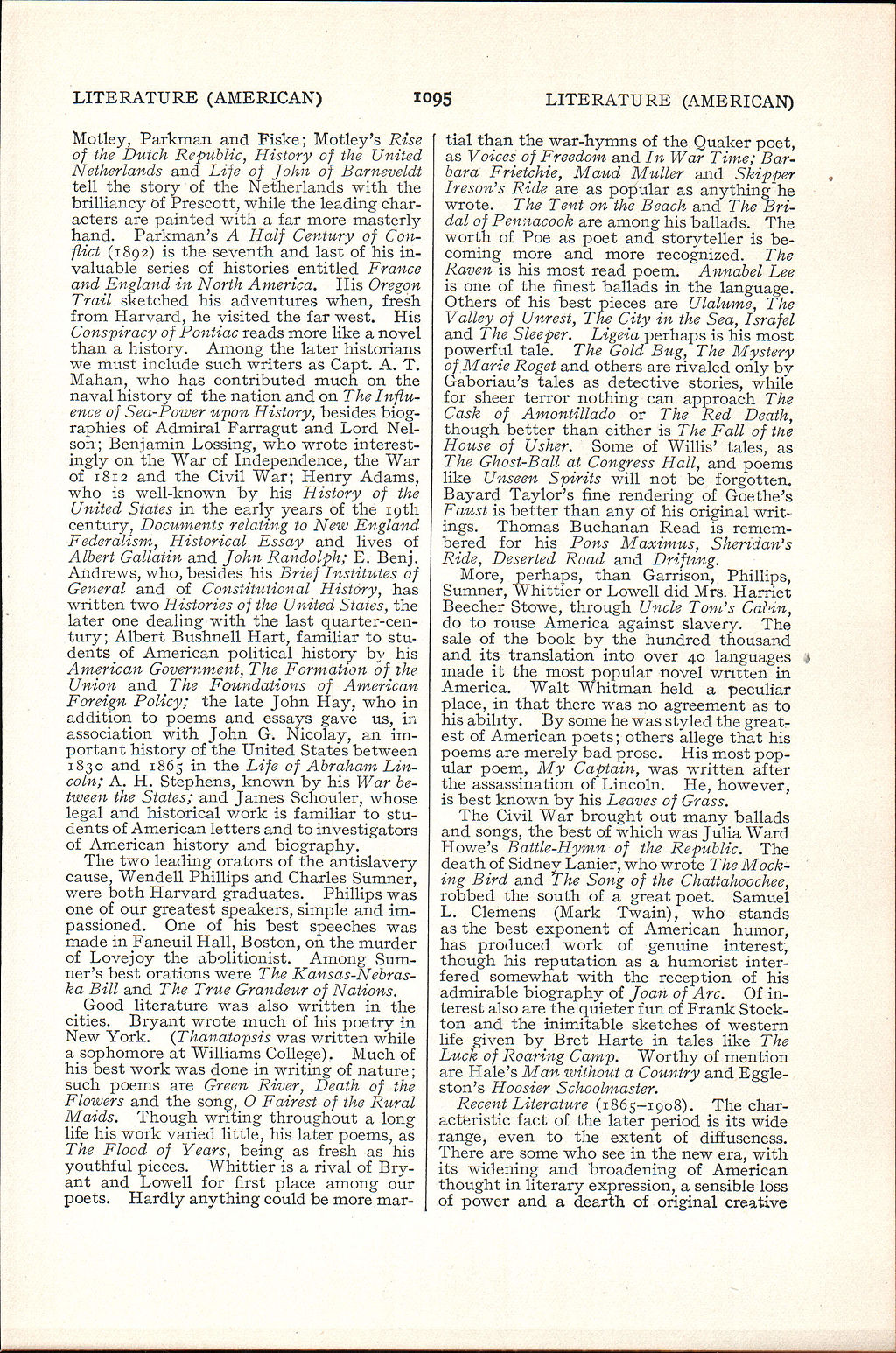Motley, Parkman and Fiske; Motley's Rise of the Dutch Republic, History of the United Netherlands and Life of John of Barneveldt tell the story of the Netherlands with the brilliancy of Prescott, while the leading characters are painted with a far more masterly hand. Parkman's A Half Century of Conflict (1892) is the seventh and last of his invaluable series of histories entitled France and England in North America. His Oregon Trail sketched his adventures when, fresh from Harvard, he visited the far west. His Conspiracy of Pontiac reads more like a novel than a history. Among the later historians we must include such writers as Capt. A. T. Mahan, who has contributed much on the naval history of the nation and on The Influence of Sea-Power upon History, besides biographies of Admiral Farragut and Lord Nelson; Benjamin Lossing, who wrote interestingly on the War of Independence, the War of 1812 and the Civil War; Henry Adams, who is well-known by his History of the United States in the early years of the 19th century, Documents relating to New England Federalism, Historical Essay and lives of Albert Gallatin and John Randolph; E. Benj. Andrews, who, besides his Brief Institutes of General and of Constitutional History, has written two Histories of the United States, the later one dealing with the last quarter-century; Albert Bushnell Hart, familiar to students of American political history by his American Government, The Formation of the Union and The Foundations of American Foreign Policy; the late John Hay, who in addition to poems and essays gave us, in association with John G. Nicolay, an important history of the United States between 1830 and 1865 in the Life of Abraham Lincoln; A. H. Stephens, known by his War between the States; and James Schouler, whose legal and historical work is familiar to students of American letters and to investigators of American history and biography.
The two leading orators of the antislavery cause, Wendell Phillips and Charles Sumner, were both Harvard graduates. Phillips was one of our greatest speakers, simple and impassioned. One of his best speeches was made in Faneuil Hall, Boston, on the murder of Lovejoy the abolitionist. Among Sumner's best orations were The Kansas-Nebraska Bill and The True Grandeur of Nations.
Good literature was also written in the cities. Bryant wrote much of his poetry in New York. (Thanatopsis was written while a sophomore at Williams College). Much of his best work was done in writing of nature; such poems are Green River, Death of the Flowers and the song, O Fairest of the Rural Maids. Though writing throughout a long life his work varied little, his later poems, as The Flood of Years, being as fresh as his youthful pieces. Whittier is a rival of Bryant and Lowell for first place among our poets. Hardly anything could be more martial than the war-hymns of the Quaker poet, as Voices of Freedom and In War Time; Barbara Frietchie, Maud Mutter and Skipper Ireson's Ride are as popular as anything he wrote. The Tent on the Beach and The Bridal of Pennacook are among his ballads. The worth of Poe as poet and storyteller is becoming more and more recognized. The Raven is his most read poem. Annabel Lee is one of the finest ballads in the language. Others of his best pieces are Ulalume, The Valley of Unrest, The City in the Sea, Israfel and The Sleeper. Ligeia perhaps is his most powerful tale. The Gold Bug, The Mystery of Marie Roget and others are rivaled only by Gaboriau's tales as detective stories, while for sheer terror nothing can approach The Cask of Amontillado or The Red Death, though better than either is The Fall of the House of Usher. Some of Willis' tales, as The Ghost-Ball at Congress Hall, and poems like Unseen Spirits will not be forgotten. Bayard Taylor's fine rendering of Goethe's Faust is better than any of his original writings. Thomas Buchanan Read is remembered for his Pons Maximus, Sheridan's Ride, Deserted Road and Drifting.
More, perhaps, than Garrison, Phillips, Sumner, Whittier or Lowell did Mrs. Harriet Beecher Stowe, through Uncle Tom's Cabin, do to rouse America against slavery. The sale of the book by the hundred thousand and its translation into over 40 languages made it the most popular novel written in America. Walt Whitman held a peculiar place, in that there was no agreement as to his ability. By some he was styled the greatest of American poets; others allege that his poems are merely bad prose. His most popular poem, My Captain, was written after the assassination of Lincoln. He, however, is best known by his Leaves of Grass.
The Civil War brought out many ballads and songs, the best of which was Julia Ward Howe's Battle-Hymn of the Republic. The death of Sidney Lanier, who wrote The Mocking Bird and The Song of the Chattahoochee, robbed the south of a great poet. Samuel L. Clemens (Mark Twain), who stands as the best exponent of American humor, has produced work of genuine interest, though his reputation as a humorist interfered somewhat with the reception of his admirable biography of Joan of Arc. Of interest also are the quieter fun of Frank Stockton and the inimitable sketches of western life given by Bret Harte in tales like The Luck of Roaring Camp. Worthy of mention are Hale's Man without a Country and Eggleston's Hoosier Schoolmaster.
Recent Literature (1865—1908). The characteristic fact of the later period is its wide range, even to the extent of diffuseness. There are some who see in the new era, with its widening and broadening of American thought in literary expression, a sensible loss of power and a dearth of original creative
